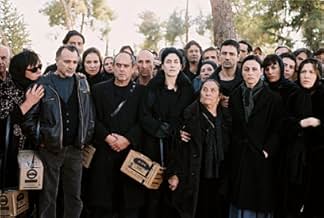When one of the brothers (Ohayn) dies, all the whole family comes for Shiva (Jewish tradition,when the family sits seven days at the home after the death one of their family). A large family... Read allWhen one of the brothers (Ohayn) dies, all the whole family comes for Shiva (Jewish tradition,when the family sits seven days at the home after the death one of their family). A large family with a lot of problems and conflicts between them.When one of the brothers (Ohayn) dies, all the whole family comes for Shiva (Jewish tradition,when the family sits seven days at the home after the death one of their family). A large family with a lot of problems and conflicts between them.
- Awards
- 4 wins & 12 nominations
Albert Iluz
- Meir Ohayon
- (as Albert Illouz)
Ruby Porat Shoval
- Therese Ohayon
- (as Ruby Shoval)
Sulika Kadosh
- Hanina Ohayon
- (as Solika Kadosh)
Dikla Elkaslassi
- Iris
- (as Dikla Elkaslassy)
- Directors
- Writers
- All cast & crew
- Production, box office & more at IMDbPro
Storyline
Did you know
- ConnectionsFeatured in Sharon Amrani: Remember His Name (2010)
Featured review
All families are different and maybe that's the hardest thing to keep in mind when watching tension mount and drama unfold in Ronit and Shlomi Elkabetz's "Shiva." We mourn and handle loss both personally and collectively in different ways and even if we think we wouldn't ever let underlying issues between family members come out in the wake of tragedy like the Ohayon family, most of us are probably not Moroccan-Israeli Jews with nine siblings.
"Shiva" premiered at Cannes in 2008 and has yet to be distributed in the United States, but I was fortunate to see it at the 2009 Chicago Festival of Israeli Cinema. Considered a who's who of Israeli acting, the film was wildly acclaimed in Israel and although it loses some of that impact on an international level, the acting is still the film's strongest aspect.
The story and structure of the film struck me as best suited for the stage. "Shiva" is a film about a sudden death in a large Moroccan Jewish family and the period of mourning directly following it, called Shiva (translated in Hebrew to "seven days" more or less). During Shiva, the family grieves in one house together for seven days to comfort each other. It's basically forced family time together, which for the Ohayon family, means tensions that otherwise might have stayed aside push to the forefront.
With nine siblings and their subsequent spouses, it's very hard to keep track of all the characters and their personal issues in this film -- just another reason why it felt like it should have been done as a play. The important points worthy of note are that several of the brothers work for one of the brothers at a factory. The departed, Maurice, also left a couple of shops behind. Then there are some love affair subplots and generally sibling discontent. All this in the context of the Gulf War too. Sirens go off and the family members must put on their gas masks. Presumably all these tensions are what push the siblings away from mourning and onto their own personal issues.
Therein is the trouble of the film. As interesting as it is to break down the psychology of these characters and their family, the truth of the matter is it's hard to believe they would be so inconsiderate and selfish during a time of tragedy for all of them. Instead of it being about cherishing Maurice's memory, they unearth deep-seated resentments and start immediately on the logistics of the future. The Elkabetzs are very cognizant of this, I think, but the disconnect is a troubling one because of how powerful death and mourning are. It's an interesting idea to show how sitting Shiva/forced communal mourning can lead to arguably unavoidable familial conflicts, but anyone who has experienced Shiva will have a hard time with these temperamental characters.
The fine actors carry out this drama effectively, however. Despite simple camera-work and what must've been a very minimal number of takes, they command their screen time when they get it. Overall, this is an affecting film. It might not resonate or provide a Hollywood catharsis, but as a character study it really captures your attention. Death is part of all cultures and when it comes down to it, no matter how you personally feel about how mourning should be handled, this is just one of many intriguing cultural perspectives. ~Steven C Visit my site at http://moviemusereviews.blogspot.com
"Shiva" premiered at Cannes in 2008 and has yet to be distributed in the United States, but I was fortunate to see it at the 2009 Chicago Festival of Israeli Cinema. Considered a who's who of Israeli acting, the film was wildly acclaimed in Israel and although it loses some of that impact on an international level, the acting is still the film's strongest aspect.
The story and structure of the film struck me as best suited for the stage. "Shiva" is a film about a sudden death in a large Moroccan Jewish family and the period of mourning directly following it, called Shiva (translated in Hebrew to "seven days" more or less). During Shiva, the family grieves in one house together for seven days to comfort each other. It's basically forced family time together, which for the Ohayon family, means tensions that otherwise might have stayed aside push to the forefront.
With nine siblings and their subsequent spouses, it's very hard to keep track of all the characters and their personal issues in this film -- just another reason why it felt like it should have been done as a play. The important points worthy of note are that several of the brothers work for one of the brothers at a factory. The departed, Maurice, also left a couple of shops behind. Then there are some love affair subplots and generally sibling discontent. All this in the context of the Gulf War too. Sirens go off and the family members must put on their gas masks. Presumably all these tensions are what push the siblings away from mourning and onto their own personal issues.
Therein is the trouble of the film. As interesting as it is to break down the psychology of these characters and their family, the truth of the matter is it's hard to believe they would be so inconsiderate and selfish during a time of tragedy for all of them. Instead of it being about cherishing Maurice's memory, they unearth deep-seated resentments and start immediately on the logistics of the future. The Elkabetzs are very cognizant of this, I think, but the disconnect is a troubling one because of how powerful death and mourning are. It's an interesting idea to show how sitting Shiva/forced communal mourning can lead to arguably unavoidable familial conflicts, but anyone who has experienced Shiva will have a hard time with these temperamental characters.
The fine actors carry out this drama effectively, however. Despite simple camera-work and what must've been a very minimal number of takes, they command their screen time when they get it. Overall, this is an affecting film. It might not resonate or provide a Hollywood catharsis, but as a character study it really captures your attention. Death is part of all cultures and when it comes down to it, no matter how you personally feel about how mourning should be handled, this is just one of many intriguing cultural perspectives. ~Steven C Visit my site at http://moviemusereviews.blogspot.com
- Movie_Muse_Reviews
- Nov 7, 2009
- Permalink
Details
Box office
- Budget
- $1,400,000 (estimated)
- Gross worldwide
- $670,892
Contribute to this page
Suggest an edit or add missing content

































